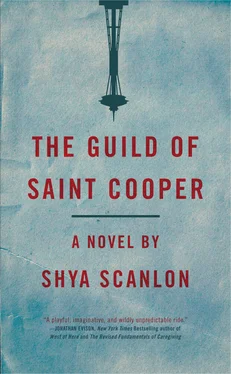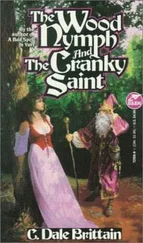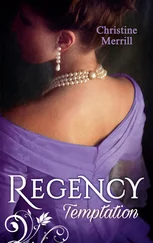“Do you really think Blake is going to come back?”
My mother looked up, her reading glasses a dragonfly perched on the tip of her nose. “Are you serious? Blake, she loves you very, very much. She said she’d be here in July, and she’ll be here in July.”
I nodded. It didn’t matter whether or not it was true. It had the desired effect. “Yeah?”
“Would I lie to you?”
I shook my head. Of course, all mothers lie to their children, and I knew this, and she knew that I knew it. But the last few days had made me feel precarious, and not a little lugubrious, and I was in need of cheap reassurance.
“How have you been lately?” I asked.
“Me?”
“Yeah. You know, how’s the pain?”
My mother took a deep breath. Her small face seemed to float above her long, deep red dress. “Isn’t it funny,” she finally said, “that pain exists inside the body, but the expression we use for it is ‘being in pain.’ It’s not inappropriate, really. You can be in pain like you can be in danger: something that’s both immanent and imminent. I hope you never have to deal with chronic pain, Blake. But so long as Zane’s grass keeps growing, I’ll cope.”
RUSSELL DROVE US UP 65th to Phinney Ridge, his white stomach stuffed behind the wheel of the quick blue convertible Porsche. He accelerated over the cross streets, and Alice, who’d flagged us down outside her parents’ house, made girlish sounds as she floated, momentarily, above the tiny back seat while Russell leered at her in the rearview mirror. He’d shown up unannounced that morning, had simply pulled up and honked out front until I came to the door. Two minutes later I’d been convinced to “see something.” We crested Phinney, dodged left, and leapt into the air on our way down the other side.
“Are we in a hurry?” I asked.
“Try to be alive,” he shouted over the buzz of the car’s high revving engine. “You will be dead soon enough!”
This sounded familiar. I tried to remember who’d said it, and watched Green Lake disappear behind the trees as we fell back to its level.
“I’m fine here,” said Alice, and the car stopped more quickly than I would have thought possible.
She climbed out and tipped an invisible hat, giving Russell a long smile.
“See you,” she said to me, and I nodded.
“That’s a fine-looking girl,” Russell said as we drove off. “How long have you known her?”
“Since she was a baby.”
“Not long, then.”
We accelerated onto Aurora and sped south through what used to be Woodland Park, one half of which was a zoo. I looked for any sign of the wild animals that used to be visible from the road, but the trees were too overgrown to see much, and of course they’d all been moved long ago.
“Saroyan!” I said.
Russell winked. “What does Seattle mean to you?”
We dodged a sapling that had pushed up through the asphalt.
“Besides catastrophe?”
“How does Seattle fit into the semiotics of the West?”
I stalled. It was becoming apparent that Russell’s whole M.O. was to slam you down in the middle of internal monologues.
“Come on, you’ve written a novel that takes place here!”
“I wrote about it because this is the place I know best.”
“Yes! So tell me what you know about it.”
“Are you talking about the passive-aggressiveness? The ‘Seattle smile’ and all that?”
“There we go. That’s a start. There are things we’ve come to accept. Look, Seattle is an extension of L.A. Seattle is what happens when ambition has kids. But that can go either way.”
“I’m not sure I follow.”
Russell slowed the car and turned in his seat to face me.
“What this city could be is a wizened calming-down, a coming-to-one’s-senses after a period of self-indulgent madness, a reemergence of skepticism following a kind of ontological suspension of disbelief. But the skepticism — and here’s the best part — the skepticism wouldn’t be total, it wouldn’t be commanding or overwhelming. It wouldn’t be cynical. At our best, there’s an acknowledgment of responsibility underlying our self-image, wouldn’t you say?”
He accelerated again, and we sped past a series of decamped crack hotels — the Waldingford Inn, the Dark Plaza Hotel, the Fremont Inn, all blurring together into a foggy memory of bad bachelor parties. Wouldn’t I say? I wondered. This vision wasn’t at all what I’d expected. The Seattle I knew seemed cynical, just not overtly. People had given up hope, they just didn’t want to admit it to their neighbors, let alone themselves. So they voted left and honked politely in their hybrid cars. They Seattle smiled. Spikes of gray smoke ahead of us caught my eye, and for the first time I put two and two together.
“We’re not crossing the bridge, are we?”
Russell shook his head, his jowls sloshing back and forth. “Certainly not,” he said. “No, we’re not going to cross. But we’re going to look.”
“Look at…”
“I want to show you what we’re up against.”
We approached slowly and stopped beside the final onramp to the bridge. Treetops to either side of the raised road reminded me that although we’d been shunted from the ground, we were still relatively safe.
Russell disagreed.
“Remember that bus accident that happened here?” he asked. “Ten years ago, some rider shoots the bus driver in the head and the whole bus careens over the edge and dives into the roof of a condominium?”
“I heard about it,” I said. “Honestly, I was never sure if it had actually happened. I thought it was an urban myth.”
“No myth. Zane was on that bus. You should ask him about it sometime. He was on his way to school.”
“Holy shit,” I said. The air was filled with the sharp, noxious smell of burning rubber. “I can’t imagine him ever going to school.”
“Well, the Zane you know clearly wouldn’t. But it happened, and that crash is written all over his face.”
The smoke rising from the bridge shot up in dark jets from three bonfires, midway across, clearly stacked with tires. The houses I’d heard about were no myth, either, but in reality they were no more than shacks, tool sheds, a shantytown in the sky, and I wondered if the same could be said for Zane’s bus. I could see perhaps three dozen people, many gathered around tables, two or three perched on the railing, one pissing off the side. They were clearly what my mother would have called “rough around the edges,” but they didn’t seem all that different from the group of people huffing paint at the birth house: the distressed, filthy clothes and the long, unkempt hair. The preference for toxic fumes. In the distance, Mt. Rainier rose like a blister over the scene.
“Maybe they came here for the view,” I said. “So what are we looking at?”
“The uncooperative.”
“People who refuse to whitewash the fence.”
Russell frowned. “I see you remain far from convinced. I have to say I figured you for the experimental type.”
“Well,” I said, “I wanted to propose something. I was thinking that instead of—”
Russell held a finger to his lips. “One word,” he said. “One more word.”
“It’s just that, I mean, Dale Cooper is—”
“Look, forget about Dale Cooper for a moment. We’ll get back to Dale Cooper. What I’d like to focus on here is Seattle. The future of Seattle, the reemergence of Seattle! “What kind of form will it take? Provided over by what spirit? A self-satisfied, arrogant, cynical spirit that’s passed through Hollywood like a box office flop and been stripped of ambition — a city that’s been beaten and whose primary emotional state is resignation? Do we want a Seattle of spiritual asylum-seekers determined to slouch back out of existence no better than when they slouched in? A pathetic parade of leave-no-tracers marching through history just to clean the streets? Because this doesn’t seem to have worked out too well.”
Читать дальше












